Retained atty. Burton-Harris withdraws; refused to fight for case dismissal despite legal precedents related to loss of file, dismissal of first jury, others
She is second attorney to withdraw after discussion with former Atty. Valerie Newman, now of the prosecutor’s office, who also withdrew
Homicide file has no forensic evidence tying Lewis to killing; Gil Hill used secret informants to contradict eyewitness reports of officer’s 1976 killing
SUPPORT CHARLES “K.K.” LEWIS AT HIS NEXT POST-CONVICTION HEARING TUES. MARCH 6, AT 9 AM, JUDGE LILLARD’S COURTROOM #502, FRANK MURPHY HALL ST. ANTOINE AT GRATIOT.
By Diane Bukowski
Feb. 20, 2018
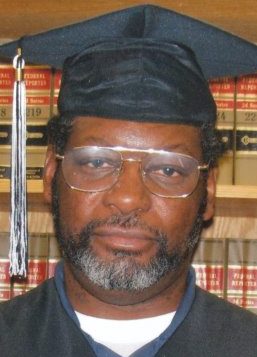
Earlier photo of Charles Lewis after class graduation in prison.
COLDWATER, MI – On January 31, 2018, a prison guard called Charles Lewis out of his quarters at Lakeland Correctional Facility in Coldwater, MI for a “hearing.” Lewis, 58, who has been in prison for 42 years on a first-degree murder charge, has become an accomplished legal scholar (“jail-house lawyer”) during that time.
He has told both Third Judicial Circuit Court Judge Qiana Lillard, the judge currently handling his hearings, and various defense attorneys, “I’ve been studying the law for 42 years, since before you were born.” He currently works as a clerk in Lakeland’s law library, assisting other prisoners.
“I asked the guard—hearing, what hearing? I don’t have any tickets,” Lewis said, referring to prison misconduct tickets.
But he was taken to Lakeland’s video room, where he was thrust unprepared in front of cameras beaming into Wayne County Circuit Court Judge Qiana Lillard’s courtroom in Detroit. Lillard has been conducting hearings on Lewis’ case since 2016, beginning with a quest to find his lost case file in order to hold a juvenile lifer re-sentencing.
During the Jan. 31 hearing, Lewis’ retained (paid) attorney Victoria Burton-Harris announced she was withdrawing from his case. The only others present at the pseudo-hearing were Judge Qiana Lillard, Assistant Prosecutor Thomas Dawson, and according to court records, Atty. Robert Burton-Harris, husband of Lewis’ attorney.
Lewis says that although Burton-Harris had told him she was planning to withdraw, he never received a copy of her motion to withdraw or a notice of the date for the hearing. Likewise, Burton-Harris has never sent him copies of any filings her office has entered into the record on his case. Lewis adds that he has sent Burton-Harris a total of 22 J-Pays (prisoner emails) outlining legal strategies for dismissing his case, which went unanswered.
VOD obtained a copy of Burton-Harris’ motion to withdraw, which says among other matters, “There has been a breakdown in the attorney-client relationship between the defendant and counsel on how to proceed. Defendant wishes to proceed with this matter in ways that counsel believes may be unethical. Defendant has expressed his dissatisfaction with the advice and representation of his counsel.”
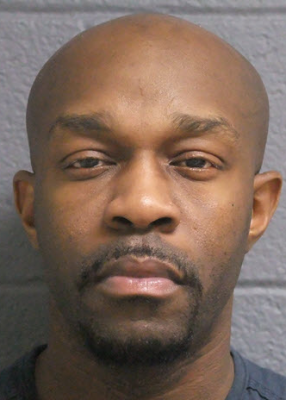
Harold L. Walker; appeals court judge says his case should have been re-assigned from Judge Lillard due to extreme bias.
VOD has requested a transcript of the Jan. 31 public hearing, since there was no prior warning it would take place. Lewis also requested a copy of that transcript and previous transcripts of hearings in front of Lillard. He said she told him he would be provided with them.
To date, however, none has been provided to either VOD or Lewis. Lewis says that Judge Lillard berated and yelled at him during the hearing. Lillard was earlier admonished by an Appeals Court Judge for loudly and repeatedly calling another defendant, Harold Lamont Walker, a “clown,” and then sentencing him to three to 75 years on a weapons charge, above the maximum allowed, lending credence to Lewis’ description of events. See http://voiceofdetroit.net/wp-content/uploads/COA-Harold-Lamont-Walker-dissenting.pdf.
Burton-Harris is the second attorney to withdraw from Lewis’ case after Atty. Valerie Newman, now of the Prosecutor’s office, withdrew. Both Burton-Harris and Attorney Nick Benton of the law offices of Gregory Rohl withdrew after negative discussions they or their partners admitted having with Newman about Lewis’ case.
“I suspect that during the time Newman represented me, she was already racking up points for the job she got with the Wayne County Prosecutor’s office,” Lewis said. Lewis also cites Judge Lillard’s employment as an Assistant Wayne Co. Prosecutor for eight years prior to the time Michigan Gov. Rick Snyder appointed her to the bench, during which she worked with assistant prosecutors handling his appeals, a possible conflict of interest.
Newman took a job as head of Wayne Co. Prosecutor Kym Worthy’s “Conviction Integrity Unit” Nov. 13, 2017. Worthy announced the revival of the unit in July, 2017, predicting nonetheless that “the overwhelming majority of convictions” would stand. Newman represented Lewis until she withdrew from his case Feb. 15, 2017. She had refused his request to appeal a Nov. 11, 2016 ruling by Judge Lillard ordering the re-construction of his official criminal case file which had been lost by the Court Clerk’s office, along with the contents of his Register of Actions from 1976 through 1999. She then left her position as head of the juvenile lifer re-sentencing division of the State Appellate Defender’s office in June, 2017.
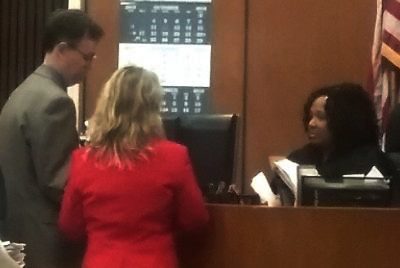
APA Jason WIlliams and defense attorney turned APA Valerie Newman hold secret, unrecorded conference with Judge Lillard Oct. 11, 2016, prior to Lewis’ appearance in courtroom.
Lewis had cited multiple U.S. Supreme Court and Michigan Supreme Court precedents which said dismissal of his conviction was the only appropriate resolution for the loss of his file.
(Newman has always refused to respond to any requests for comment from VOD.)
Lewis is one of Michigan’s 247 juvenile lifers, two-thirds of the total 363, who prosecutors have recommended be re-sentenced to life without parole. The U.S. Supreme Court, in Miller v. Alabama (2012) and Montgomery v. Louisiana (2016) recommended that “only the rarest” child should be sentenced to die in prison. Only a few of them the “Michigan 247” have seen any court action on their cases.
Michigan has the second highest number of juvenile lifers in the country; Wayne County has the highest number among counties in Michigan, 147, at least 70 percent of them Black. Prosecutor Kym Worthy has recommended new life sentences for 67 of them, 98 percent Black, the highest number of any Michigan county.
Although Lewis and his family have always maintained his innocence of the killing of off-duty Detroit police officer Gerald A. Sypitkowski in 1976, his legal arguments as conveyed to his attorneys do NOT stand on the innocence claim. Controversial 2014 Michigan state statutes relating to juvenile lifer re-sentencings allegedly do not allow re-consideration of the actual conviction, despite estimates by some that some 20 percent of the state’s juvenile lifers are innocent.
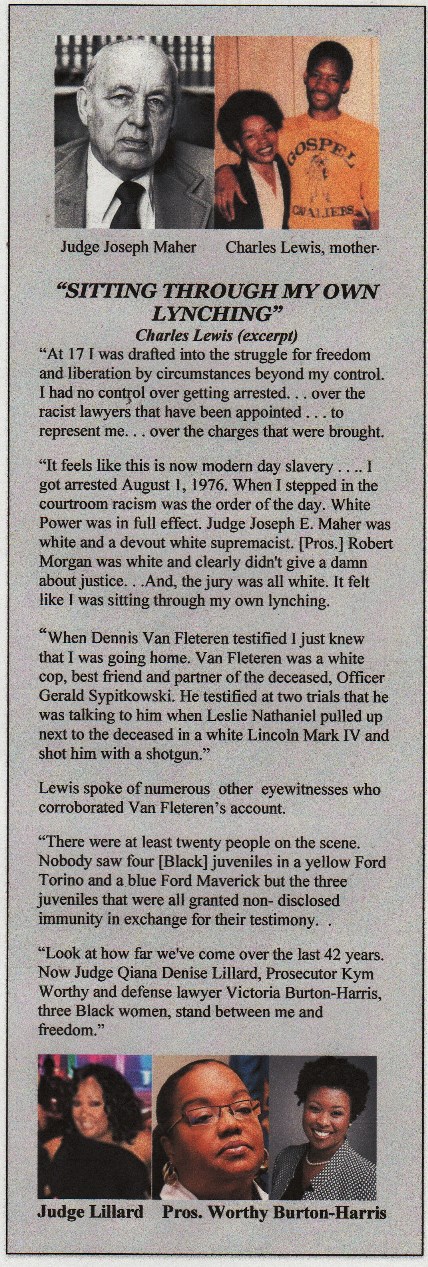 Among the 22 unanswered JPay emails to Atty. Burton-Harris citing various legal precedents that should result in the dismissal of his case, Lewis says he sent the message shown excerpted in the box at right prior to her request to withdraw
Among the 22 unanswered JPay emails to Atty. Burton-Harris citing various legal precedents that should result in the dismissal of his case, Lewis says he sent the message shown excerpted in the box at right prior to her request to withdraw
In his most recent JPays, forwarded to VOD, Lewis asked Burton-Harris to file motions to dismiss his case citing People v Benton, 402 Mich 47, 260 NW2d 77 (1977), and People v Fullwood, 392 Mich 75.
He said, “Fred Benton was convicted of armed robbery before Judge Geraldine Bledsoe Ford. The first trial resulted in a mistrial declared on the court’s own motion. At the second trial a motion by defendant to dismiss the charges on grounds of double jeopardy was denied.
He quoted the Michigan Supreme Court’s ruling, “This Court accords considerable deference to a judge’s determination of whether there is manifest necessity justifying declaration of a mistrial. A mistrial may only be declared, however, after an on the record consideration and discussion of alternatives with counsel. The wishes of the defendant and his counsel can then be ascertained and a full exploration of the alternatives undertaken. In the instant case correct procedures were not followed. Had they been observed the insignificance of the error may have been discovered and discussion proper curative instructions given. Instead, an unnecessary mistrial was declared. We conclude that there was no manifest necessity to declare a mistrial. Reversed.”
He continued, “My case is on all fours with Benton. Could you please file a motion to dismiss my case based on Benton, supra? Also, on September 30. 2017, I JPayed you People v Fullwood, 392 Mich 75. My file cannot be reconstructed and pursuant to FULLWOOD should be dismissed. Could you file a motion to dismiss based on FULLWOOD?”
The Fullwood decision bars the reconstruction of criminal case files.
Among the lost portions of Lewis’ file is most of the transcript of his first trial, held in March, 1977 in front of Judge Joseph Maher. That jury trial was completed, but according to Lewis and his mother Rosie Lewis, when the jury foreman returned with the verdict form, Judge Maher did not read it for the record. Instead he called prosecution and defense attorneys to the stand, consulted with them off the record, and then dismissed the jury without cause. The verdict form is not in the small portion of the transcript that exists.
Third Judicial Circuit Court Judge Deborah Thomas confirmed their version in her appellate opinion filed Aug. 16, 2006.
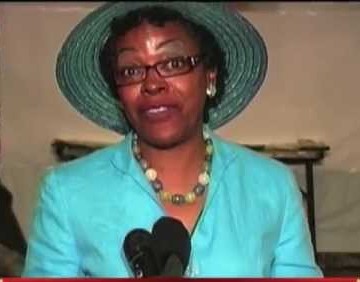
Judge Deborah Thomas, twice a candidate for Michigan Supreme Court
“Judge Joseph Maher discharged the jury on March 22, 1977 without conducting a hearing or making findings on the record,” Judge Thomas wrote. “This Court has thoroughly reviewed the transcript of the first trial looking for any possible reason to dismiss the jury. This Court could not find a reasonable, or logical reason to dismiss the first jury.
“This Court also thoroughly searched the first record looking for a request for a mistrial by the defendant. There is no request on record by the Defendant for a mistrial. The Court also looked for a request by the prosecution for a mistrial, and there is likewise no request by the prosecution for a mistrial.
“A thorough reading of the first trial transcript discloses no errors that would warrant a mistrial. There is nothing in the record that indicates either the Defendant or the prosecution brought a motion for a mistrial. Thus the court can only conclude from a silent record that Judge Joseph Maher dismissed the jury sua sponte. This court concludes that the unconstitutional discharge of the jury in the first trial was the equivalent of an acquittal.”
Judge Thomas said that meant double jeopardy attached, and Lewis should never have been re-tried. See Judge Deborah Thomas’ opinion at http://voiceofdetroit.net/wp-content/uploads/DThomasOpinion2-1.pdf.
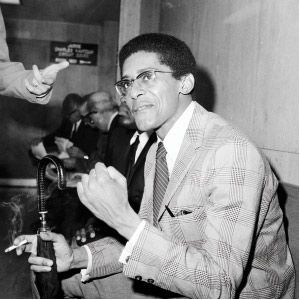
Activist attorney Kenneth Cockrel Sr. was targeted by Judge Joseph Maher for calling the judge a racist.
Maher was well-known at the time for his unsuccessful campaign to take the law license of militant attorney Kenneth Cockrel, Sr. for calling Maher various forms of a racist in comments to the media. Maher also facilitated the acquittal of notorious S.T.R.E.S.S. (“Stop the Robberies, Enjoy Safe Streets”) cop Raymond Peterson. Undercover S.T.R.E.S.S cops killed 22 unarmed Black men in the late ’60’s to early ’70’s. Peterson killed at least six of those. He was acquitted in the trial Maher handled, but later fired by the police department for the murder in question.
Lewis said when he first hired and paid Burton-Harris, he told her he wanted her to argue for the dismissal of his case, not hold a juvenile lifer re-sentencing based on controversial 2014 state statues.
“Prior to [my] October 6, 2017 SHOW CAUSE HEARING, the defendant explained to defense counsel that she needed to argue all of the OBJECTIONS cited in the June 23, 2017 pleading entitled OBJECTIONS and all four of the issues raised by the Defendant to preserve his right to appeal his objections to the reconstructed file and the four issues to the Michigan Court of Appeals,” he wrote to her. See Charles Lewis Objections document at http://voiceofdetroit.net/wp-content/uploads/C-Lewis-Objections-6-23-17.compressed-1.pdf.
Judge Lillard earlier announced that hearings would proceed based on issues raised in this document, after Benton withdrew. But after Burton-Harris came on board, the scenario changed.
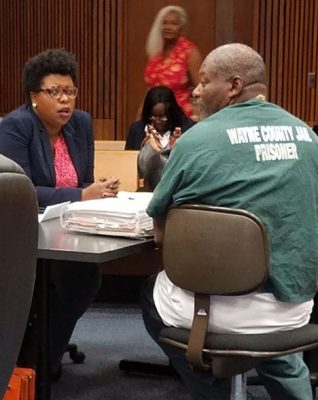
Atty. Burton-Harris and client Charles Lewis in evident disagreement during discussion in court.
“Victoria Burton-Harris assured the defendant that she was going to vigorously argue the objections and all four issues. However, at the hearing Victoria Burton-Harris did not argue or address any of the defendant’s objections to the reconstructed file. Instead she argued that Judge Lillard had the authority to order the reconstruction of the file pursuant to MCR 3.607. That argument was not approved by the Defendant, argued by the prosecution or accepted by Judge Lillard.”
He has also cited other precedents. They include the state’s refusal to vacate his conviction after its failure to hold a “Pearson” evidentiary hearing including witnesses Maher had barred from Lewis’ second trial, within the time limits prescribed by state law (another issue upheld by Judge Deborah Thomas.)
He has argued that the state refused to honor an April 3, 2000 order signed by Judge Gershwin Drain belatedly dismissing his case. (Drain denies any involvement, but the fraction of Lewis’ Register of Actions that remains shows Drain handled his case. One version shows he dismissed the conviction; a second version says Lewis was convicted in front of Drain on April 3, 2000.)
Lewis has repeatedly questioned why the Court Clerk’s office has not been reprimanded or otherwise held to account not only for the loss of his file and Register of Actions, but also for the loss of many other prisoners’ files. Since the state began juvenile lifer re-sentencings, many defense attorneys have complained that lifer files in particular have been lost or destroyed in whole or in part. Current Registers of Actions for many defendants are not kept up to date by Deputy Court Clerk David Baxter and his office.
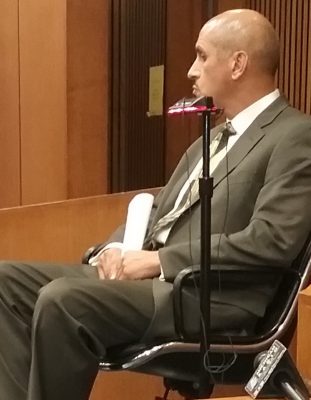
Deputy Clerk David Baxter, who oversees the Criminal records division of the Clerk’s office.
Lewis also argues that since Third Judicial Circuit Court Judge Edward Ewell, Jr. vacated his conviction and sentence in October, 2012, subsequent juvenile lifer state statutes passed in 2014 do not apply to him, violating ex post facto rules. He says that either Ewell or Drain’s successor Judge James Chylinski should be handling his current hearings.
Other juvenile lifers including Efren Paredes, Jr. have raised the same ex post facto claim in their appeals.
DPD homicide file on Lewis case
Regarding the issue of Lewis’ innocence, which is separate from his legal arguments for dismissal under current law, VOD obtained a redacted copy of his Detroit Police Department homicide file, as well as a copy of Sypitkowski’s autopsy report.
The homicide file shows that Lewis had NO PREVIOUS CRIMINAL CONVICTIONS at the time of his arrest in this case. It mentions juvenile offenses, but says that they were dismissed in court. Lewis at the time was a talented young musician who played numerous instruments, and took care of his four younger siblings to help his working mother during his stepfather’s two years out of town on another job.
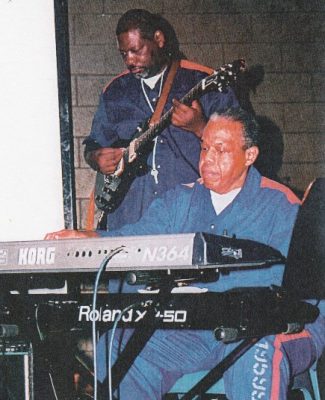
Charles Lewis, an accomplished musician, plays guitar with Bill Lemons on keyboard in prison band.. Lewis is now 58, Lemons is 73, still serving life. Lewis played every instrument beginning in childhood. A promising musical career was cut short by his false conviction.
The DPD file is full of eyewitness statements from Sypitkowski’s partner Dennis Van Fleteren, other police officers, and civilians on the street outside Oty’s bar near Harper and Barrett when Sypitkowski was killed. The majority of the statements report that the shots which killed Sypitkowski came from a white Lincoln Mark IV, with “three Black men” in the front seat. Detroit police pursued the vehicle and arrested its owner Leslie Nathanial. But then Sgt. Gil Hill released Nathanial after talking to him for several hours.
In one document, Hill claimed he received a call from an unnamed, numbered informant singling out Lewis as the killer. A Detroit News article by David Grant, oddly on teletype, is in the file, which specifies that the informant identified others as well.
It says: “Hill said the police were led to the three suspects by an informant who called the homicide desk . . .Hill said he later obtained the names of the three men after meeting with the informant in the Burger King restaurant on Gratiot near Conner. . . ”
The file contains statements from the three juveniles, Mark Kennedy, Ronald Pettway, and Jeffrey Mulligan, two of whom claimed they saw Lewis kill Sypitkowski. Their statements are handwritten in writing identical to that of Chief Investigation Officer Marvin Johnson and other police, shown at the top of the statements. They are only signed at the conclusion by them and their relatives. In return for their testimony, they were removed as defendants from the original case. (See report below.)
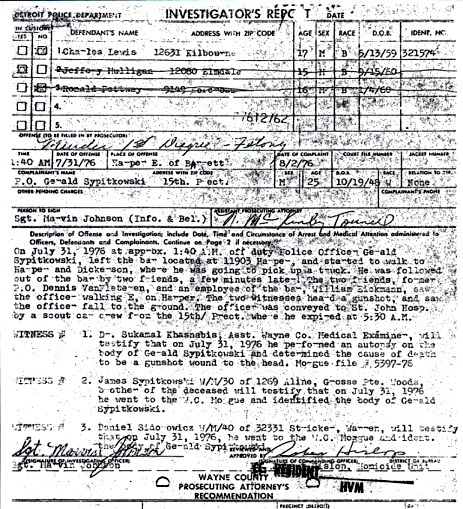
Original Investigator’s Report on Lewis case shows names of two original defendants, who agreed to testify against Lewis, crossed out, mentions no other witnesses.
Also in the file are allegations that Lewis and his accomplices robbed and shot a pizza delivery man, Raymond Cassabon, just before killing Sypitkowski, but there is no police report or witness statement from Cassabon in the file, nor any medical records pertaining to Cassabon’s injuries. A separate court file pertaining to charges against Lewis in that case has also gone missing.
The DPD file does not include any forensic evidence against Lewis. Police claimed they found “1 piece of plastic buttstock” and “1 plastic forearm” they said were “common to shotguns manufactured by Savage/Stevens” in Pettway’s garage. Online records show shotguns with plastic (Tenite) pieces were manufactured only from 1947-1953.
Neither the shotgun pieces nor any gun were presented at Lewis’ court hearings, but his court-appointed attorney, M. Arthur Arduin, known for his ties to the Detroit mob, stipulated to their existence. There is no record in the file that police ever fingerprinted the shotgun pieces.
The medical examiner reported taking pellets and wadding from Sypitkowski’s head, but said “The 3 pieces of lead could possibly be pellets of buckshot. It was not possible to dofinitely determine the size due to their poor condition. The fiber wadding is comparable to that used by Winchester Western in the loading of their buckshot ammunition.”
An investigator named Parris from the WCME’s office commented at the end of the report:
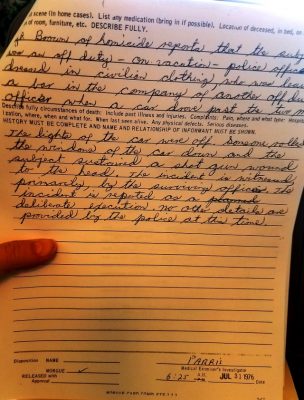
Many believed Sypitkowski was the victim of a deliberate hit, as the ME’s report says, related either to the mob or to the police themselves. Leslie Nathanial worked at an auto plant with Lewis’ mother Rosie Lewis. Workers at the plant reportedly went to him to play their numbers; the mob controlled most of the city’s bookmaking at the time.
Significantly, an official listing of “Fallen Officers” from the Detroit Police Department does not include Sypitkowski. (See http://voiceofdetroit.net/wp-content/uploads/DPD-Fallen-Officers.pdf)
Hill said a second unidentified informant told DPD the location of the yellow Ford Gran Torino Lewis was accused of being in when Sypitkowski was killed. The only photograph of that car in the file shows it in the 7th precinct impound lot. There is no fingerprint evidence identifying Lewis or the juvenile defendants on that car. The white Lincoln Mark IV was also impounded. While in police possession, its windows were smashed out and other damage done, destroying possible evidence. Additionally, sugar was poured into its gas tank (note open gas cap).
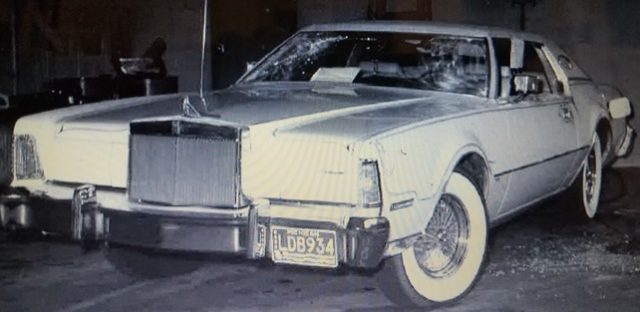
White Lincoln Mark IV from which many witnesses reported gunfire that killed officer originated. It is shown in police pound; police said it was damaged after being transported there.
Hill was later twice investigated by the FBI, but not charged, for his involvement in the cover-up of the 1985 drive-by murder of a 13-year-old child, Damion Lucas, allegedly by Detroit’s Curry brothers drug gang, and in 1991, for his alleged involvement in an FBI sting operation aimed at rooting out cops protecting drug dealers.
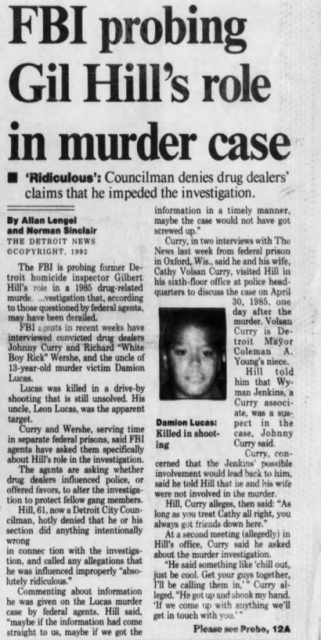 He is also singled out in a forthcoming documentary, “650 Lifer–The Story of White Boy Rick,” by a self-identified former hit man, Nate “Boone” Craft. Craft says, without proof, in a clip shown on Detroit’s Channel 4 News, that Hill offered him $125,000 to kill Rick Wershe, Jr., an informant for the FBI on Detroit police corruption, including Hill’s cover-ups in homicide cases.
He is also singled out in a forthcoming documentary, “650 Lifer–The Story of White Boy Rick,” by a self-identified former hit man, Nate “Boone” Craft. Craft says, without proof, in a clip shown on Detroit’s Channel 4 News, that Hill offered him $125,000 to kill Rick Wershe, Jr., an informant for the FBI on Detroit police corruption, including Hill’s cover-ups in homicide cases.
Hill played a major role at Lewis’ trials, testifying instead of the chief investigating officer Sgt. Marvin Johnson, who was said to be in the hospital. Statements from the Lincoln Mark IV witnesses including Dennis Van Fleteren were taken, but ignored by court-appointed defense attorney Arduin in his opening statement and summation. (Lewis had earlier asked the judge to remove Arduin as his attorney).
Hill was also the prosecuting attorney in the notorious case of Eddie Joe Lloyd, framed up for the rape and murder of a 15-year-old schoolgirl in Detroit in 1982.
Lloyd was later freed by Barry Scheck’s Innocence Project after spending 17 years in prison. He died not long afterward.
Related stories:
http://www.thedimedroppers.com/2016/03/a-corrupt-and-vindictive-cop-passes.html
WAYNE CO. PROS. KYM WORTHY’S APPT. OF VALERIE NEWMAN TO ‘CONVICTION INTEGRITY UNIT’ CALLED SHAM
#TAKETHEKNEE! FRI. OCT. 6; FREE CHARLES LEWIS, INNOCENT, IN PRISON 41 YEARS; COURT FILES DESTROYED
CASES SEEK ABSOLUTE BAN ON LIFE WITHOUT PAROLE SENTENCES FOR YOUTH FROM U.S. SUPREME COURT





Charles Lewis Should be Free no questions ask .